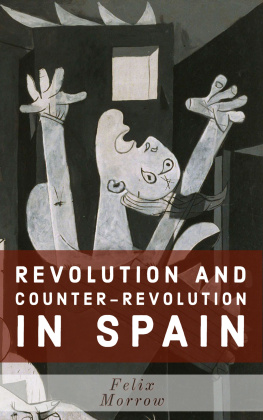Pritchett - The Spanish Temper
Here you can read online Pritchett - The Spanish Temper full text of the book (entire story) in english for free. Download pdf and epub, get meaning, cover and reviews about this ebook. City: London;Spain, year: 1954;2011, publisher: Bloomsbury Publishing;Bloomsbury Reader, genre: Art. Description of the work, (preface) as well as reviews are available. Best literature library LitArk.com created for fans of good reading and offers a wide selection of genres:
Romance novel
Science fiction
Adventure
Detective
Science
History
Home and family
Prose
Art
Politics
Computer
Non-fiction
Religion
Business
Children
Humor
Choose a favorite category and find really read worthwhile books. Enjoy immersion in the world of imagination, feel the emotions of the characters or learn something new for yourself, make an fascinating discovery.

- Book:The Spanish Temper
- Author:
- Publisher:Bloomsbury Publishing;Bloomsbury Reader
- Genre:
- Year:1954;2011
- City:London;Spain
- Rating:5 / 5
- Favourites:Add to favourites
- Your mark:
- 100
- 1
- 2
- 3
- 4
- 5
The Spanish Temper: summary, description and annotation
We offer to read an annotation, description, summary or preface (depends on what the author of the book "The Spanish Temper" wrote himself). If you haven't found the necessary information about the book — write in the comments, we will try to find it.
The Spanish Temper — read online for free the complete book (whole text) full work
Below is the text of the book, divided by pages. System saving the place of the last page read, allows you to conveniently read the book "The Spanish Temper" online for free, without having to search again every time where you left off. Put a bookmark, and you can go to the page where you finished reading at any time.
Font size:
Interval:
Bookmark:
By
V. S. PRITCHETT

For Dorothy
This electronic edition published in 2011 by Bloomsbury Reader
Bloomsbury Reader is a division of Bloomsbury Publishing Plc, 50 Bedford Square, London WC1B 3DP
Copyright 1954
The moral right of author has been asserted
All rights reserved
You may not copy, distribute, transmit, reproduce or otherwise
make available this publication (or any part of it) in any form, or by any means
(including without limitation electronic, digital, optical, mechanical, photocopying,
printing, recording or otherwise), without the prior written permission of the
publisher. Any person who does any unauthorised act in relation to this publication
may be liable to criminal prosecution and civil claims for damages
ISBN: 9781448200979
eISBN: 9781448202294
Visit www.bloomsburyreader.com to find out more about our authors and their books
You will find extracts, author interviews, author events and you can sign up for
newsletters to be the first to hear about our latest releases and special offers
This is a personal book and not primarily a work of information. It assumes the reader has at any rate read his Guide. I write because, of all the foreign countries I have known, Spain is the one that has made the strongest impression on me. I went there first in the 1920s as a very young man and lived there for nearly two years; the effects of the experience were drastic and permanent. I might almost say, without being guilty of rhetoric, that the sight of the landscape of Castile changed my life. It is not difficult to see why this should be so: I read Unamunos Del Sentimiento Trgico de la Vida. But even had I not done so I would still have seen that Spain is the old and necessary enemy of the West. There we learn our history upside down and see life exposed to the skin. Neither in France nor in Italy can one be so frankly frightened. All the hungers of life are blankly stated there. We see the primitive hungers we live by and yet, by a curious feat of stoicism, fatalism, and lethargy, the passions of human nature are sceptically contained.
In variety, strangeness, and grandeur the Spanish landscape is unequalled in Europe. I went to live in Madrid in 1924, and in the next two years travelled in most parts of the country. I walked in the mountains of the Asturias, in the Gredos and the Guadarrama. Two years later I walked from Badajoz through Extremadura to Vigo, staying mainly in the villages of that region. The journey is described in a juvenile book, Marching Spain, now happily out of print and it took place in the happy period of Primo de Rivera. I went again several times until 1935, and by then the rising in the Asturias had occurred and the prisons were full; fanaticism on the Right and the Left was rapidly taking Spain into the Civil War. This war brought horror down upon the Spaniards and, for the foreigner, its deceptions and shames. Few of my Spanish friends took the simple view of Spanish history and society which was offered to them by the early stages of the anti-fascist struggle in Europe; quickly they were divided, many were murdered by one side or the other. While, on the one hand, the disgraceful swindle of Non-intervention was being managed by the powers, and the British government abandoned their traditional Spanish policy and betrayed their friends, it also became clear, on the other hand, that Western ideologies were instinctively rejected by the Spaniards. Woe to the foreigner of any party who gets involved in the Spanish quarrel and who believes Spain is an extension of Europe.
I did not expect ever to go to Spain again after 1935, but the force of the original attraction was permanent. Curiosity was too strong and I went in 1951 and 1952 to find a country often greatly changed on the surface, overrun by tourists in the show places, poor in body, stunned in mind, but not, as it seems to me, fundamentally changed. These two journeys are the immediate basis of the present book. It contains many generalizations and observations which will be disputed, for Spaniards rarely agree about anything that is said about their country; but in so far as general statements can be made by a traveller, they will be found, I think, to have plenty of sources in Spanish literature and life. I owe many debts which are recorded in the text. I would especially draw the attention of those who are interested in the background of the Civil War to read Franz Borkenaus The Spanish Cockpit. I owe a great deal of the material relating to the economic background to my friend Gerald Brenans two books: The Spanish Labyrinth and The Face of Spain. No one knows the country better than he does; no one is wiser and more illuminating about it.
V. S. PRITCHETT

I make these notes during those two hours of impatience which begin in the early morning when the electric train clatters out of Biarritz Ville. One is hungry and queasy, one has slept badly and begins smoking nervously and too soon. In the corridor no one wants to talk after this night. Women are patching up their faces, combing their hair, men stand outside rubbing the nights growth of beard. The lavatory smells. One watches the long shadows of the rising sun in the pines; one sees the dust, the dewy greenness, the dry, heavily tiled houses, the fruitful green of a kind climate, a candid sky, and the sedate life. Yesterdays sun is still warm in these villa towns of terra-cotta. Here one would be glad to have a dolls house and count ones pension and rentes thirty times a day like a Frenchman and rest ones nervous northern mind in conversation consisting largely of abstract nouns, to parcel out ones sous, ones pleasures and permissions.
But the prolonged sight of France annoys; one is impatient for the drama of the frontier and for the violent contrasts, the discontent and indifference of Spain. One is anxious to fill out that famous text of Galds, so often quoted from the Episodios Nacionales: O Spain, how thou art the same into whatsoever part of thy history one may look! And there is no disguise to cover thee, no mask to hide thy face, no fard to disfigure thee, for wherever thou appearest, thou art recognized at once from a hundred miles away, one half of thy facefiesta; and the other misery; one hand bearing laurels and the other scratching thy leprous sores.
To know what we are up against we ought to go to Spain by aeroplane and fly to the centre of it. Beneath us England is packed with little houses, if the earth is visible at all through the haze; France lies clearly like green linoleum broken into a small busy pattern, a place of thriving little fields; but, cross the dark blot of the Pyrenees, and Spain is reddish brown, yellow, and black, like some dusty bull restive in the rock and the sand and (we would guess) uninhabited. The river-beds are wide and bleached and dry. After Switzerland this is the highest country in Europe. The centre is a tableland torn open by gorges, and on the table the mountain ranges are spaciously disposed. There is little green, except on the seaboard; or rather the green is the dark gloss of ilex, olive, and pine, which from the height at which we are flying appear in lake-like and purple blobs. For the most part we are looking down at steppe which is iced in the long winter and cindery like a furnace floor in the short summer. Fortified desertand yet the animal image returns again and again in this metalled and rocky scene, for occasionally some peak will give a sudden upward thrust, like the twist of a bulls horns, at the wings of the plane. Flying over Spain, we wonder at the torture that time had put upon the earths crust and how human beings can live there. In Soria, the terrible province, below the wicked mountains of Aragn I remember picking up an old woman who had fallen off her donkey and carrying her to the side of the road and wiping the blood off her nose. She was a figure carved in wood, as light as a husk. It was like having starvation in ones hands.
Font size:
Interval:
Bookmark:
Similar books «The Spanish Temper»
Look at similar books to The Spanish Temper. We have selected literature similar in name and meaning in the hope of providing readers with more options to find new, interesting, not yet read works.
Discussion, reviews of the book The Spanish Temper and just readers' own opinions. Leave your comments, write what you think about the work, its meaning or the main characters. Specify what exactly you liked and what you didn't like, and why you think so.






